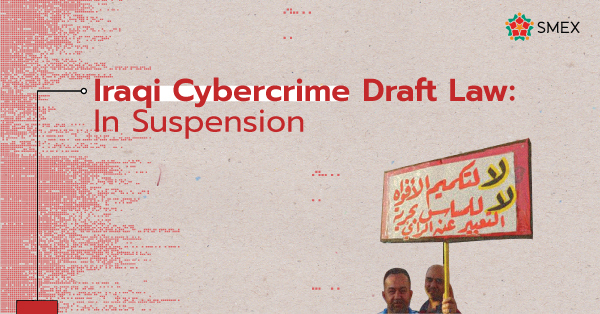On June 5, 2022, Iraq’s Security and Defense Parliamentary Committee announced that it will reintroduce the Cybercrime Draft Law for parliament to vote on during its current session. The law would give authorities the right to monitor and prosecute citizens for their social media posts. The Committee stressed that the Law should be passed in order to prevent crimes, although many fear that it will be misused to suppress people’s freedom of opinion and expression.
Back in 2021, the Iraqi Parliament announced that it would suspend the draft law until it is amended to ensure it protects rather than infringes upon free speech. However, amid last year’s numerous attempts to reintroduce the law, Speaker Mohamed Al Halbousi vowed that “the law will not pass” during a meeting with Western ambassadors and leaders of international organizations.
According to Iraqi researcher Asia Al Obaidi from the Iraqi Network for Social Media (INSM), the reason the law is yet to be approved—despite it coming into focus over 10 years ago—is that “legislators are trying to restrict the freedom of opinion and expression, especially for defenders of human rights, activists, and journalists,” adding that “the law will enable authorities to detain and oppress people for their online posts.”
Obaidi explained that the draft law “includes 21 articles that deprive people of their liberties and lists 63 cases in which citizens would be subject to sanctions, based on the definitions adopted by the law. These include 10 cases punishable by life imprisonment and a fine ranging from 25 to 50 million Iraqi dinars (USD 17,000 to USD 34,000).”
According to Obaidi, the law also imposes “penalties of temporary imprisonment in 25 cases, in addition to a fine ranging from 10 to 30 million Iraqi dinars (USD 6,800 to USD 20,000), as well as 28 other cases punishable by imprisonment for less than 5 years and a fine ranging from 2 to 30 million Iraqi dinars (USD 1,370 to USD 20,000).”
Therefore, Obaidi stresses “the need to involve civil society organizations in the serious efforts to introduce amendments to this law,” while acknowledging that “Iraq can no longer implement a Penal Code enacted at a time when cyber-crimes did not exist.”
However, Obaidi confirms that the law in its current form should be rejected, “as it would lead to the imprisonment of any person whose social media posts are not aligned with the ideas or beliefs of a certain political group, leading to more chaos and arbitrary threats, which would, in turn, further undermine freedom of expression in Iraq.”
An Iraqi cybersecurity expert and web designer who chose to remain anonymous pointed out that the government proposed a “cybercrimes” draft law in 2011, Article 3 of which (on penal provisions) included vague and extremely broad terminology that authorities could later use as they please to impose harsh sanctions and penalties, including imprisoning people for life.
In 2019, an amended version of the same law was submitted, under the new title of “Combating Cybercrimes,” but, according to the expert, in essence the purpose of the law remained the same: “To restrict the freedom of expression in favor of the interests of the authorities, as well as to allow for the law to be loosely interpreted so it can be used as a tool to suppress freedom of expression.”
The draft law was rejected in 2019, but continued to be reintroduced during each parliamentary session. Critics of the law agree that it will enable authorities to prosecute social media users for using pseudonyms, that it does not differentiate between criticisms and insults against public figures and institutions, and that it restricts the right to access and publish information, especially on corruption.
The draft law introduced in 2021 was opposed by Human Rights Watch (HRW), which issued a statement considering that “the law would have allowed Iraqi authorities to prosecute anyone for any social media or online post that they didn’t like by arbitrarily deeming the content a threat to governmental, social, or religious interests.” HRW also stated that “the harsh punishments the law imposes, including exorbitant fines and minimum prison sentences, could also have a chilling effect on freedom of expression.”
Iraqi Journalists: We are not protected
Iraqi journalist and rights activist Akram Al Sayyab described the suspended cybercrime draft law as “Big Brother who is always watching your posts on social media and restricting the freedom of opinion and expression.”
Sayyab told SMEX that “Iraqi legislators have not enacted any laws regulating the field of journalism and freedom of the press specifically; rather, cybercrimes are addressed based on case law and the principle of referral, as well as on miscellaneous articles from the 1969 Penal Code.”
According to Sayyab, journalists in Iraq face “a security, rather than a legislative challenge. We are armed with nothing but our pen, while those who oppose our ideas are carrying machine guns—ready to fire.”
On May 31, 2022, Iraqi Journalist Majed Soudani was attacked in Najaf, where assailants set his car ablaze in front of his house, according to the Journalistic Freedoms Observatory (JFO). The latter reported a rise in cases of violence, killings, and threats against Iraqi journalists and activists.
There is also a large discrepancy between the law and security directives. For example, Sayyab explained that “while journalists are legally authorized to film and conduct interviews in any public space or government facility, directives given to security officers prohibit such practices.”
Iraqi digital journalist Mohamed Moumin also expressed his concern that the cybercrime law, which has yet to be enacted, “will become a tool for oppression rather than for protecting journalists and activists,” noting that the Law on Publications, issued before the emergence of the internet, is often used to prosecute journalists.
Moumin concluded by saying that although “the internet in Iraq has become infested with crimes of blackmail, defamation, and hate speech, the harsh provisions and the vague terminology of the draft law and the Penal Code constitute a threat to journalists and offer protection to powerful and influential individuals against criticism.”

